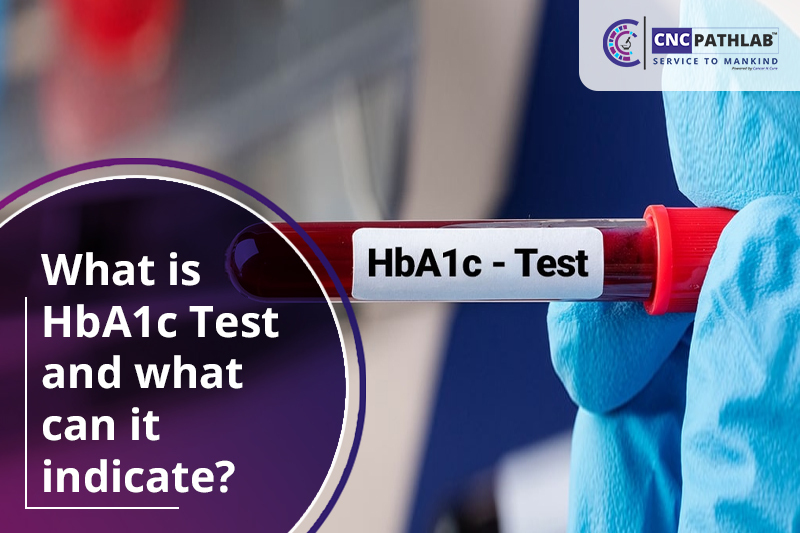What is HbA1c Test and what can it indicate?
Checking your blood sugar levels on a daily basis can help you understand your current situation. This is why it is recommended to check your HbA1c levels every three to six months to determine your long-term sugar levels.
An HbA1c (Hemoglobin A1c) blood test is a useful indicator of average blood sugar over a three-month period. Blood tests in general can be helpful in diagnosing a wide range of conditions. Because some conditions have no obvious signs or symptoms, a blood test may be the first indication that something is wrong. This is one of the reasons that prediabetes and type 2 diabetes frequently go undetected for years before they are diagnosed. However, if diabetes is detected early, it may be possible to prevent or delay it, and even reverse prediabetes.
The HbA1c test is frequently the wake-up call that some people require in order to make healthy lifestyle changes to prevent or manage diabetes, such as eating a balanced diet, exercising regularly, sleeping well, and focusing on stress management.
How Frequently Do You Need the Test?
When you are diagnosed with diabetes, your doctor will most likely order the A1c test. You will also have the test if your doctor suspects you have diabetes. The test will establish a baseline level, allowing you to see how well you control your blood sugar.
The frequency with which you'll need the test after that is determined by a number of factors, including:
- Your type of diabetes
- Your blood sugar management
- Your treatment strategy
- If you have prediabetes, which means you have a high risk of developing diabetes, you will most likely be tested once a year.
- If you have type 2 diabetes, don't use insulin, and your blood sugar levels are usually within your target range, you may be tested twice a year.
- If you have type 1 diabetes, you could get it three or four times a year.
- You may also need the test more frequently if your diabetes treatment plan changes or if you begin taking a new medication.
- This isn't a fasting test. It can be taken at any time of day, before or after meals.
Signs or Symptoms to take HbA1c Test
There are some indicators that may indicate the need for an HbA1c test, whether they are diabetes symptoms or risk factors to be aware of.
The following are symptoms of diabetes:
- heightened thirst
- Urination that is excessive
- heightened hunger
- Fatigue
- Vision impairment
- Unknown cause of weight loss
- Numbness or tingling sensations in your hands or feet
- Infections that occur frequently
- Wounds that heal slowly
If you are at risk for diabetes and have the following risk factors, you should have your HbA1c tested:
- Prediabetes
- Blood pressure is high.
- A family history of heart disease
- Diabetes during pregnancy
- Obesity or being overweight
- Inactivity physically (being physically active less than three days a week)
- Have a diabetic parent or sibling?
- Obesity or being overweight
- Are 45 years of age or older
What are the Benefit of lowering HbA1c?
Improving HbA1c in Diabetes patients reduces the risk of complications such as:
- Retinopathy
- Neuropathy
- Diabetic
- Nephropathy
- Cataracts
- Heart Failure
- Peripheral vascular disease
What do the HbA1c results mean?
HbA1c levels are calculated as a percentage and can be interpreted as follows:
|
HbA1c value |
Average Glucose value |
Diagnosis |
|
5.6% or less |
117 mg/dl or less |
Normal |
|
5.7-6.4% |
117-137 mg/dl |
Prediabetes |
|
6.5% or more |
137 mg/dl |
Diabetes |
Way to Lower your HbA1c
It's natural to be concerned if your levels have risen above your target since your last check. Even a slightly elevated HbA1c level increases your chances of developing serious complications in your body.
All you have to do is concentrate on reaching your A1c target level and making appropriate lifestyle changes.
- Your diabetes team may need to review your medication and possibly increase the dose or switch to a different one.
- Inquire about local diabetes education courses – there is always more to learn about diabetes, and a course will assist you in taking practical steps to lower your HbA1c.
- Increase your physical activity – moving more is good for everyone, but it can specifically help to lower your HbA1c levels.
- Learn about balanced, healthy eating.
- Stop smoking – smoking makes it difficult for blood to circulate throughout your body.
- Monitor your sugar levels regularly
The cost of an HbA1c test in Delhi varies depending on where you live and which pathological lab you visit. However, it is quite reasonable and not at all exorbitant. Again, because the benefits outnumber the drawbacks, the costs are outweighed.
CNC Pathlab HbA1c tests can be scheduled because we have a team of experienced health professionals who have access to cutting-edge technology. CNC Pathlab is your trustworthy medical laboratory, with a large customer base that values accurate test results. Get quick results at the best prices in the industry.


.jpg)


.jpg)
